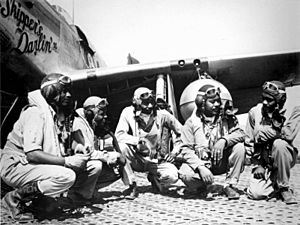Clarence D. Lester facts for kids
Quick facts for kids
Clarence D. Lester
|
|
|---|---|

Colonel Clarence Lester
|
|
| Nickname(s) | Lucky |
| Born | February 23, 1923 Richmond, Richmond City, Virginia, US |
| Died | March 17, 1986 (aged 63) Washington, District of Columbia, District Of Columbia, US |
| Buried |
Arlington National Cemetery, Virginia, US
|
| Allegiance | United States of America |
| Service/ |
|
| Years of service | 1942-1969 |
| Rank | Colonel |
| Unit | 322nd Fighter Squadron Tuskegee Airmen |
| Battles/wars | World War II |
| Awards | Congressional Gold Medal awarded to the Tuskegee Airmen |
Clarence D. “Lucky” Lester (February 23, 1923 – March 17, 1986) was a brave American pilot. He flew planes for the United States during World War II. He was part of the famous 332nd Fighter Group, also known as the Tuskegee Airmen.
Colonel Lester was one of the first African-American pilots in the U.S. military. He was known for his amazing flying skills. On one mission, he shot down three enemy planes. Only a few Tuskegee Airmen achieved this in a single day. He flew a P-51 Mustang plane named "Miss Pelt."
Contents
Early Life and Education
Clarence D. Lester was born in Richmond, Virginia, on February 23, 1923. He grew up in Chicago, Illinois. He went to West Virginia State College. There, he was a talented football player.
Flying with the Tuskegee Airmen

The Tuskegee Airmen were a special group of African-American military pilots. They flew fighter and bomber planes in World War II. They were part of the 332nd Fighter Group.
Being a black pilot in the 1940s was very important. Lester said it was like being a pro athlete today. These pilots knew they had to prove themselves. They were the first black Americans to have such a chance in the military.
White pilots usually flew about 50 combat missions. But the Tuskegee Airmen flew around 70 missions. This was because there were no replacement pilots for them. During the war, Lester flew over 90 combat missions. He was one of only nine Tuskegee Airmen to shoot down at least three enemy planes.
After World War II
After the war, Lester continued his military career. Once, while flying an F-84E Thunderjet, his plane caught fire. He had to use his ejection seat to escape. He was one of the first pilots ever to use this safety method.
In 1969, Lester retired from the military as a full colonel. After that, he worked in social services in Rockville, Maryland.
Awards and Recognition
- Congressional Gold Medal awarded to the Tuskegee Airmen in 2006. This is one of the highest awards given to civilians in the United States.
Personal Life
Clarence Lester was a Catholic.
 | Janet Taylor Pickett |
 | Synthia Saint James |
 | Howardena Pindell |
 | Faith Ringgold |

